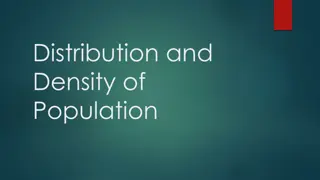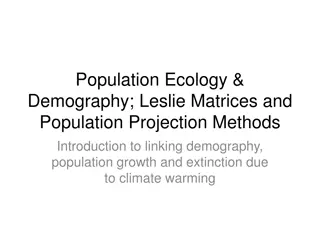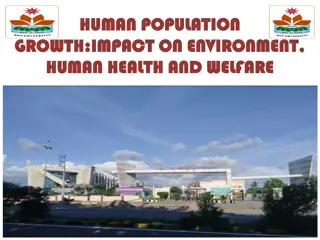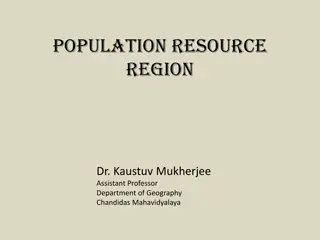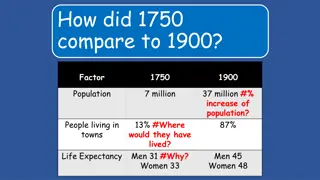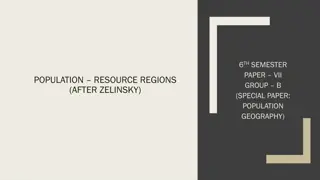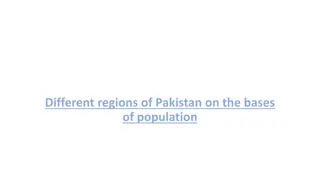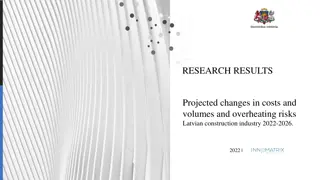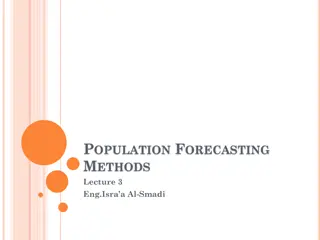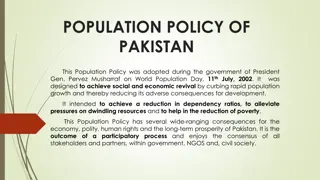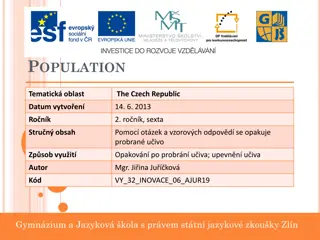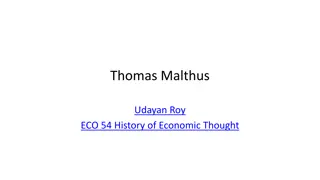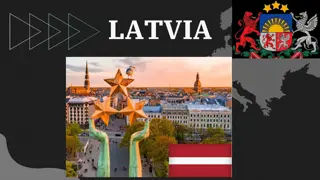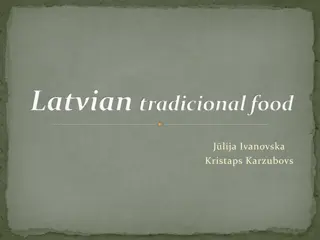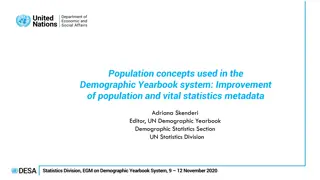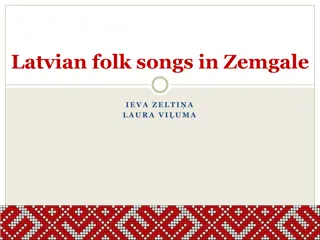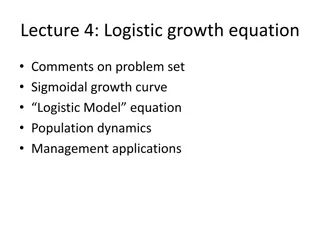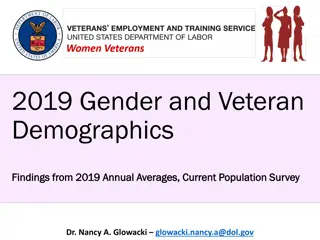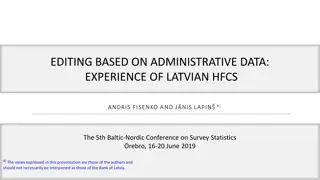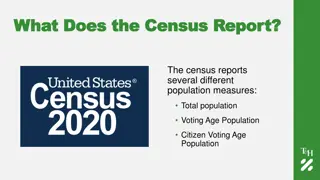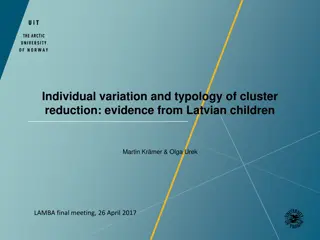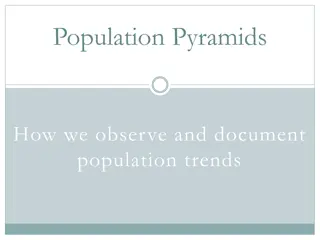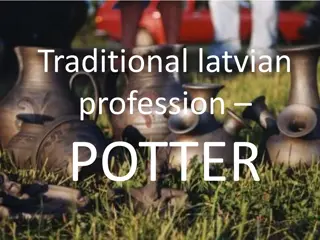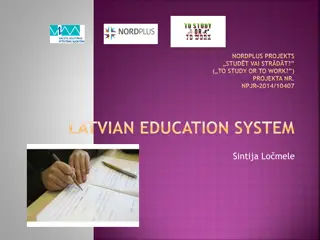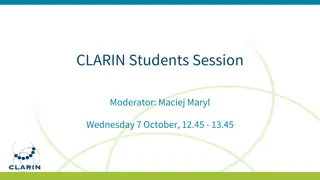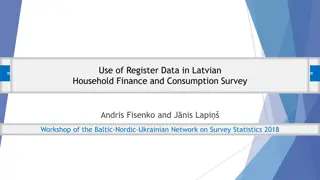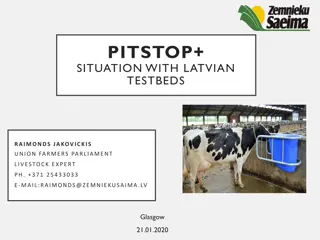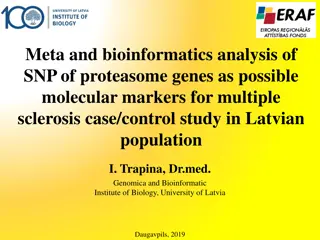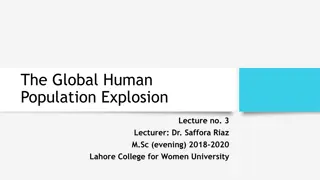Overview of the South African National Population Register
The South African National Population Register (NPR) is a vital system maintained by the Department of Home Affairs. It serves to record and update information on the country's resident population, issue identity documents, and handle related administrative tasks. The NPR has evolved over the years
2 views • 16 slides
Distribution and Density of Population.
Population distribution and density are closely related concepts that describe the spatial patterns and proportional relationships of human populations across the world. Factors such as physical landscapes, socio-cultural influences, and demographic trends contribute to the regional disparities in p
10 views • 9 slides
Understanding Population Ecology and Demography Through Leslie Matrices
Explore the critical aspects of population ecology and demography, focusing on factors influencing abundance, population growth, regulation, and the impacts of climate change. Learn about population projections, growth models, age-structured populations, and data requirements for estimating populati
4 views • 35 slides
Impact of Human Population Growth on Environment and Welfare
The rapid growth of the human population is placing immense pressure on the environment, leading to increased demand for resources like food, water, and shelter. The effects of human activity on the environment have escalated significantly over the years due to population expansion. High birth rates
0 views • 8 slides
Introduction to Sampling in Statistics
Sampling in statistics involves selecting a subset of individuals from a population to gather information, as it is often impractical to study the entire population. This method helps in estimating population characteristics, although it comes with inherent sampling errors. Parameters represent popu
2 views • 24 slides
Understanding Population-Resource-Region Relationship: A Geographical Perspective
Explore the intricate relationship between population, resources, and regions through a geographical lens. Delve into classifications based on population, resources, and technology, with examples from different countries and regions. Discover the concepts of optimum population, over-population, and
1 views • 11 slides
Understanding Demography: Population Trends and Analysis
Demography is the study of population size, distribution, and composition, encompassing elements such as mortality, natality, migration, and demographic forces. Population census plays a crucial role in collecting and analyzing demographic data, with methods like De Jure and De Facto census. Inter-c
6 views • 21 slides
Comparing 1750 to 1900: Population Growth in Britain
The population of Britain saw a significant increase between 1750 and 1900. In 1750, the population was 7 million, and by 1900, it had grown to 37 million. This represented an 87% increase. The number of people living in towns also rose from 13% to a higher percentage. Factors contributing to this g
0 views • 6 slides
Population Resource Regions and Zelinsky's Classification
Geographers have long studied the relationship between population growth and resource adequacy, leading to the concept of Population Resource Regions (PRR) by W. Zelinsky. Zelinsky identified five types of PRR based on population-resource ratios, ranging from Type A with high resource utilization po
0 views • 8 slides
Population Distribution in Different Regions of Pakistan
The population distribution in Pakistan varies significantly among different regions, with certain provinces like Punjab and Sindh having higher population densities compared to Baluchistan and FATA. The rural areas are also categorized into different population density regions based on the number o
0 views • 14 slides
Forecasted Changes in Latvian Construction Industry 2022-2026
Forecasted changes in costs and volumes, along with overheating risks, in the Latvian construction industry from 2022 to 2026 were analyzed by 83 experts. The research aims to aid in planning procurement costs efficiently and anticipate potential price fluctuations. Forecasts indicate a 0.9% increas
0 views • 22 slides
Methods of Population Forecasting for Urban Development
Designing water supply and sanitation schemes for cities requires accurate population forecasting. Factors influencing population changes include births, deaths, migration, and annexation. Various methods like Arithmetic Increase, Geometric Increase, and Ratio Method are used to predict population g
4 views • 24 slides
Understanding the Concept of Population and Unit Stock
The concept of population revolves around all organisms of the same species living in a specific area capable of interbreeding. It is essential to differentiate between sample populations and real populations to accurately study their attributes such as birth rates, death rates, and spatial dimensio
0 views • 15 slides
Population Policy of Pakistan: Vision, Goals, and Strategies
The Population Policy of Pakistan, adopted in 2002, aims to stabilize the population by 2020 through a focus on reducing fertility rates and promoting family planning. The policy outlines goals such as achieving a balance between resources and population, increasing awareness of rapid population gro
0 views • 11 slides
Latvian Rituals, Temple, and Priesthood: A Spiritual Journey
Explore the rich tradition of Latvian rituals, temple structures, and the sacred priesthood. Discover the deep spiritual connection to divinity, the concept of divine perfection, and the significance of ritual spaces like temples and natural energetic places. Delve into the unique folk structure of
0 views • 20 slides
Exploring Population Data of the Czech Republic
The data presents insights into the population of the Czech Republic, including demographics, language distribution, religious beliefs, literacy rates, life expectancy, and urban population percentages. The population pyramid reveals a dominance of people in the age group of 20-49, with longer life
0 views • 8 slides
Thomas Malthus and His Theory on Population Growth
Thomas Robert Malthus, an influential economist, proposed a theory on population growth in the 18th century. His theory suggested that population grows exponentially while food production increases at a slower rate, leading to inevitable food scarcity. Malthus also discussed the concept of preventiv
2 views • 19 slides
Discover Latvia: A Brief Overview of Culture, Nature, and Traditions
Latvia, one of the Baltic states, is bordered by Estonia, Lithuania, Russia, and Belarus. The country has a rich cultural heritage, with a population of about 1.9 million and the official language being Latvian. Explore its diverse cities like Riga, its temperate seasonal climate, education system,
0 views • 13 slides
Traditional Latvian Foods: A Culinary Journey Through Latvia
Explore the rich culinary heritage of Latvia with traditional dishes like caraway cheese, grey peas with bacon, Riga sprats in oil, bread soup, beetroot soup, and rye bread. These delectable dishes showcase the unique flavors and cultural significance of Latvian cuisine.
0 views • 10 slides
Latvian Folk Dress: Symbol of National Values and Cultural Heritage
Folk dress in Latvia holds significant symbolic importance, representing national values and cultural heritage. The tradition of wearing traditional attire dates back to ancient times, with different styles reflecting historic periods. From ancient bronze ornaments to linen tunics and woolen coats,
0 views • 17 slides
Louisiana Parish Population Statistics 2010
Louisiana Parish Population Statistics for the year 2010 reveal varying population numbers across different regions. The data provides insights into demographic changes and trends over the past decade. The total population change by parish and age group highlights shifts in different age brackets. T
0 views • 42 slides
Improvement of Population and Vital Statistics Metadata in the Demographic Yearbook System
The Demographic Yearbook system focuses on enhancing population and vital statistics metadata to ensure accurate and concise reflection of population concepts across 230+ countries. It involves annual collection of official national population estimates, vital statistics, and UN international travel
0 views • 16 slides
Latvian Folk Songs in Zemgale: A Glimpse into Rural Life
Latvian folk songs from the Zemgale region offer a window into the traditional life of farmers, focusing on seasonal rituals, work cycles, and celebrations. These songs not only reflect the agricultural practices and customs but also celebrate the connection between people and nature. The songs are
0 views • 9 slides
Understanding Logistic Growth in Population Dynamics
Explore the logistic growth equation and its applications in modeling population dynamics. Dive into the concept of sigmoidal growth curves and the logistic model, which reflects population growth with limits. Learn how to calculate population change using the logistic growth equation and understand
0 views • 26 slides
Insights on 2019 Gender and Veteran Demographics
Analysis from the 2019 Annual Averages of the Current Population Survey reveals significant statistics regarding gender and veteran populations in the United States. Data indicates that veterans comprise 7.5% of the overall population, with women veterans totaling almost 2 million. Women veterans ma
0 views • 48 slides
Study on Vitality of Primary Latvian Verbs: A Diachronic Analysis
Primary Latvian verbs are derived from roots preserved in verbs, nouns, or adjectives. Some verbs have disappeared, and factors like semantics and morphology may have influenced their preservation. The study analyzed 461 primary verbs to understand the reasons behind their preservation or disappeara
0 views • 22 slides
Latvian Household Finance and Consumption Survey Experience by Andris Fisenko and J. Nis Lapi
Latvian HFCS, a joint project of Bank of Latvia and Central Statistical Bureau, aims to gather micro-level data on households' assets and liabilities every three years. The survey includes person-level and household-level data, with a focus on economic decisions. Despite a low response rate, the sur
0 views • 27 slides
Overview of Population Measures and District Data from Census Reports
The census reports various population measures including total population, voting age population, and citizen voting age population. The data includes breakdowns by ethnicity for each trustee district. Changes in voting and citizen voting age population percentages are also provided. Data is sourced
0 views • 4 slides
Discover the Rich Heritage of Latvian Ceramics
Latvian ceramics have a long history, with each region showcasing unique styles, shapes, and colors. From ancient techniques to modern creations, Latgale, Kurzeme, and Vidzeme regions offer a diverse range of exquisite ceramic products like jugs, bowls, vases, and more. Explore the traditional craft
0 views • 10 slides
Evidence of Cluster Reduction in Latvian Children
Investigation explores errors in L1 acquisition of complex word-initial onsets in Latvian children, examining the role of sonority, constraints on complex onsets, and factorial typology of OT constraints. Data from the LAMBA phoneme test with 20 Latvian-speaking children highlights various cluster t
0 views • 18 slides
Understanding Population Pyramids for Analyzing Population Trends
Population pyramids are graphical illustrations that showcase the distribution of age groups within a population, segmented by gender. By observing and documenting the patterns of population pyramids, one can discern trends such as rapid growth, slow growth, or negative growth, which are influenced
0 views • 7 slides
Exploring the Evolution of Latvian Pottery: From Tradition to Innovation
Discover the rich history of Latvian pottery, from its origins in the 10th-13th centuries to its significance as an essential material on farms. Explore the craftsmanship of potters, their use of the pottery wheel, and the integration of new technologies into this traditional art form. Delve into th
0 views • 8 slides
Overview of the Latvian Education System
Latvian education system comprises primary, secondary, and tertiary levels. It begins with compulsory and free primary education for children aged 5 to 18. The system includes vocational and general secondary schools, gymnasiums, and higher education establishments. School subjects taught range from
0 views • 13 slides
Contrastive Study of Management Science Thesis Texts in English and Latvian
Understanding the importance of academic text types, this study focuses on the structure and language of management science thesis summaries in English and Latvian. It addresses challenges such as language conventions, lack of immediate consultation, translation issues, and the need for doctoral stu
0 views • 11 slides
Insights into Latvian Household Finance and Consumption Survey
The Latvian Household Finance and Consumption Survey gathers micro-level structural data on households' assets, liabilities, economic decisions, demographics, employment, and more. This joint project includes 18 European countries and involves sampling, data collection, editing, and imputation at th
0 views • 25 slides
Gateway to the USA - AmCham Latvia's Initiative for Transatlantic Trade
Gateway to the USA is an initiative by AmCham Latvia aimed at fostering trade, investment, and partnership between the United States and Latvia. Through a joint platform with LCCI, the program seeks to promote bilateral trade, encourage Latvian companies to do business in the U.S., and facilitate th
0 views • 14 slides
Latvian Testbeds in Livestock Farming with Raimonds Jakovickis
Situation analysis of Latvian testbeds managed by Raimonds Jakovickis, an expert in livestock farming, at the Union Farmers' Parliament. The testbeds at Ltd. MPS Vecauce involve testing cows equipped with electronic ear tags, with recent improvements in farm infrastructure and results reported in De
0 views • 8 slides
Analysis of Proteasome Gene SNPs as Molecular Markers for Multiple Sclerosis in Latvian Population
This study by I. Trapina aims to investigate the prevalence and functionality of SNPs in proteasome genes to assess their potential as molecular markers for multiple sclerosis in the Latvian population. Multiple sclerosis is an autoimmune disease affecting the central nervous system, and the role of
0 views • 13 slides
Maine Workforce and Population Trends Analysis 2014-2024
Maine's workforce and population outlook from 2014 to 2024 reveals a decline in births, resulting in an aging population and workforce imbalance. The state faces challenges due to low birth rates, negative natural population change, and minimal net migration, impacting labor force growth and total p
0 views • 31 slides
The Global Human Population Explosion: Causes and Implications
The lecture explores the rapid increase in the global human population post-World War II, analyzing factors such as birth rates, mortality rates, and life expectancy. Various counterarguments are presented, including the debate on population growth benefits, ethical concerns over reproductive interf
0 views • 20 slides

